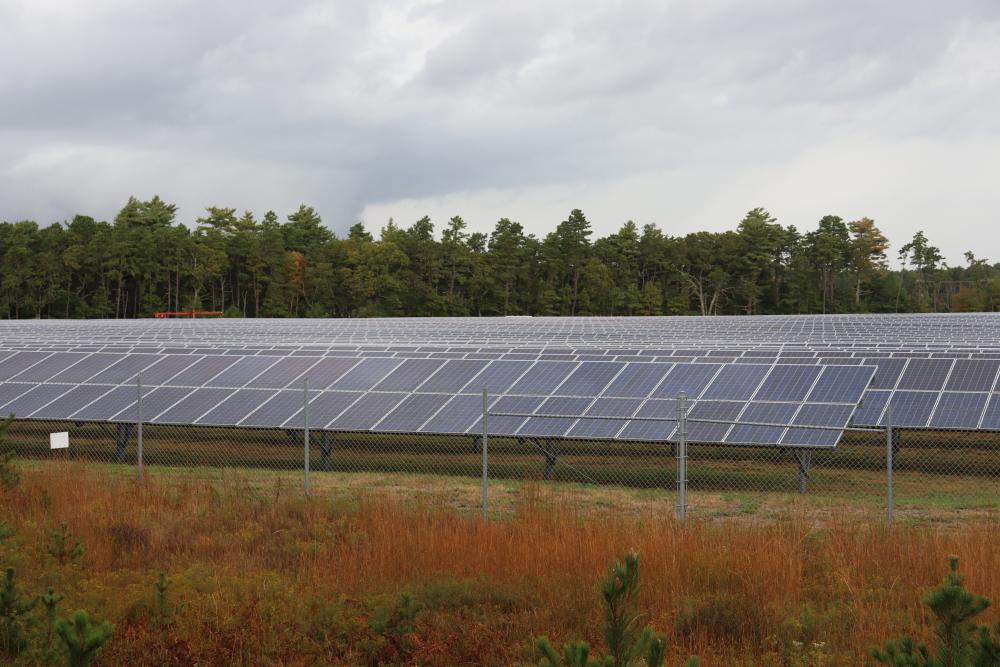State regulations threaten town control of solar projects
Town officials have raised concerns that Wareham could lose control over large-scale solar developments under a proposed state law that would change how those projects get approved.
The new law will result in a “loss of control by municipal entities over very big land use and planning issues,” said Select Board member and long-time energy industry lawyer Sherry Quirk.
This potential lack of local control is “frightening,” said Select Board member Sarah Corbitt, particularly with regard to large solar arrays.
“Those are the ones that could do this town the most damage” from developers clear-cutting forests to make space for solar development, she said.
What do the regulations do?
For months, Wareham officials have raised the alarm about the state’s proposed law, describing it as the solar equivalent of 40B housing regulations, which give the state control over affordable housing developments.
The law is intended to encourage new solar, wind and energy storage facilities, improving Massachusetts’ infrastructure to address the impacts of climate change. It aims to consolidate the process of permitting clean-energy projects and to speed up the timeline for getting them approved.
While the fine details of the new process haven’t been settled yet, some of its broader features have come into focus.
Large solar and battery storage projects — those over 25 megawatts — will be reviewed by the state, not by local planning boards. Quirk said a 25-megawatt project requires at least 100 acres of land, and would be larger than anything currently proposed or approved in Wareham.
The town would still have authority to review smaller projects under 25 megawatts — the type that have already been built in Wareham — but it would have to comply with a state-issued deadline for completing its review, as well as a state-written set of bylaws and procedures, said Quirk.
Will these state-written bylaws overwrite the town’s own bylaws?
“That’s what I would assume,” she said.
How will this change Wareham?
It’s still unclear the impact these changes would have on the town. According to Quirk, much of it depends on the details of the new state-written bylaws, which wouldn’t be finalized until after the bill gets passed.
“I like to be optimistic,” said Quirk, who added that if the state’s bylaws include protections for forests and for disadvantaged communities — which the state has said is a priority — they could be an overall good for the town.
However, “because we don’t know any details, it’s hard to know whether to be happy about this or not,” she said.
No matter what is included in the bylaws, some residents still have concerns that the state could take control over solar projects away from Wareham.
“I think it’s absurd,” said Annie Hayes, an activist who has organized in opposition to the Fearing Hill solar project for years. “I think it’s criminal.”
The people who live near a proposed solar project understand how it could impact the area, said Hayes.
“There are all these things that only people in the community, in the neighborhood, care about,” she said.
Not so for the authors of the state’s law, said Hayes. “They’re not cutting down the trees in their suburbs.”
How does this impact current solar projects?
Only two solar projects are currently before the Wareham Planning Board: One on Fearing Hill and one at 370 County Road.
Both of these projects will likely reach a conclusion before the new law comes into effect, according to Planning Board Chair Carl Schulz. “The board is not slowing down or stopping [while] waiting for the state.”
While neither of these projects will be affected by the new law, Schulz said it’s possible that other developers are holding off on their applications until things get sorted out at the state level.
“I think a lot of folks are just waiting to see what’s going on with the regulations,” Schulz said.
Corbitt said she has a “mounting concern over the fact that solar developers seem to have their eye on Wareham and our large forests — we need to keep them.”
What happens next?
The state Senate passed its version of the bill, S.2838, on Tuesday, June 25. In a statement, 3rd Bristol Plymouth Senator Marc Pacheco, whose district includes Wareham, said the bill “includes vital steps to prepare the Commonwealth for our transition to clean energy.”
The House passed its own version of the bill, H.4884, on Thursday, July 18. Currently, the Senate and the House are working on a compromise bill, which will then go to Governor Maura Healy for her signature, said Quirk.
However, even when the bill gets signed into law, more work will need to be done. Language in the House’s version of the bill suggests a 2026 deadline for the completion of the new regulations.
“We really don’t know what it is. We don’t know exactly how it’s going to affect Wareham. It could be bad. I think it’s better to remain optimistic and to hope that the state is doing something good,” said Quirk.













